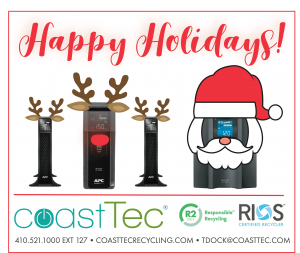
Responding to recent criticism of certifications generally, e-Stewards leadership argues standards have evolved to be more user friendly and are prepared to address a rapidly changing industry. | sasirin pamai/Shutterstock
Bob Akers’s op-ed in E-Scrap News raised the question: “How valuable are the standards and certifications in our industry today?”
To answer, let’s first take a quick trip into the time machine. We can all remember the scenes from Asia and Africa of electronic waste mismanagement that the Basel Action Network (BAN) first brought to global attention in 2002-08. It was a time of eye-opening public awareness of the e-waste problem. Following this, more than a decade ago, the U.S. EPA asked what their role should be in improving the situation, and the overwhelming view of stakeholders was that a set of best practices was needed. It was BAN that insisted these be more than a manual but rather a third-party audited certification. Out of that process two standards were born – R2 and e-Stewards, the latter differing in that it was committed to alignment with international rules (Basel Convention) barring the export of hazardous wastes to developing countries even in countries where the government had not yet ratified these rules.
A lot has evolved since those days. Today, global dumping, as first reported by BAN two decades ago, is greatly diminished and each day more universally condemned. Certification is now the price of admission to be a serious actor in the e-cycling business, because the public has become more aware and sensitized to the harm that bad recycling can cause. While recyclers can paint pretty green pictures, state that they recycle everything domestically, and write certificates of 100% destruction on their websites, we can all sleep better at night when these claims can be verified.
Today, for an aware public and business community, certified recycling is simply a far better product than an unverified set of green claims. Corey Dehmey of SERI correctly argued in his recent op-ed response that certifications are just good for business. Indeed, there are numerous examples of how they create a framework to make recyclers safer, run more efficiently, and avoid liabilities. But we would argue more broadly that, in fact, verifying and then rewarding good behavior makes the world a better place overall. The public at large and businesses everywhere are all the beneficiaries of a good certification program for an essential service we all need: e-cycling.
Some keys to successful certifications
If people now take the strides of the industry these last 10 years for granted and question their value because they are now expected, we suppose that is the price of success. But is starting from square one truly the way forward? Most assuredly not. We do, however, absolutely agree with Mr. Akers that certifications must continue to evolve and be ready to pivot to stay relevant. We must never rest on the laurels of past success lest we miss the new challenges and opportunities of a rapidly changing industry and what it is capable of achieving. We believe that a successful and relevant future for e-Stewards and for other certifications lies in stressing the following:
- Beyond preventing bad behavior, incentivize and applaud good behavior while creating new positive initiatives. Certifications must become more than a policing instrument against problems – they should increasingly become a means to leverage the industry’s social and environmental enhancement capacities. Our ADVANCE+ initiative, for example, focuses on providing jobs for individuals with autism and other disabilities. Digital equity efforts are another prime example to help overcome the digital divide and provide computers and internet access to low-income communities.
- Resist the temptation to keep adding requirements to a standard. Be very strict on real threats, while allowing for innovation on the rest. Making a standard better should not be confused with making a standard thicker! Audit times should not be increasing. The critical requirements (data security, toxic exposures, international dumping) should be very prescriptive and enforced; the rest should allow for new ideas, flexibility and innovation. Version 4.0 of our standard has been achieved with that in mind: shorter, clearer and more user-friendly.
- Create an open and constructive community of support. Building a community is invaluable in staying relevant with trends and providing the best advice. We hit on this model early on by holding face-to-face meetings, open public comment periods on alterations, and having a multi-stakeholder Leadership Council and Alumni. The e-Stewards support community also includes the 50 or so enterprise companies, cities, and universities that agree to help promote best practices and positive programs.
- Keep a steady and ready supply of tools and information for your members and the public. Do not hesitate to offer webinars, white papers, news, videos and podcasts on the changing industry and policies around the world. Ensure that customer service and response to public inquiries are rapid.
- Anticipate the future: Be ready for new hardware challenges and become a force for more proactive green design initiatives. Is our industry really ready to properly manage photovoltaics, the coming EV battery mountain, and the myriad Internet of Things devices being produced and lodged in virtually everything? Plastic with too many toxic additives? Should we not become more of a vehicle for green design of e-products? Our Leadership Council has open seats for OEMs precisely because of the need to close the gap between product design and proper end-of-life management. This is the pivot we all must make going forward.
In these ways, we believe e-Stewards and other certification programs can evolve to meet the needs of their true customers, which are not just the processors, but also those they provide their vital services to – all of us.
Aaron Blum of ERI, Karen Dietel-Jenks of Cascade Asset Management, Brooks Hoffman of Iron Mountain, Mark Newton of Samsung and Caitlin Sanchez of Vizio are members of the e-Stewards Leadership Council.
The views and opinions expressed are those of the author and do not imply endorsement by Resource Recycling, Inc. If you have a subject you wish to cover in an op-ed, please send a short proposal to [email protected] for consideration.



